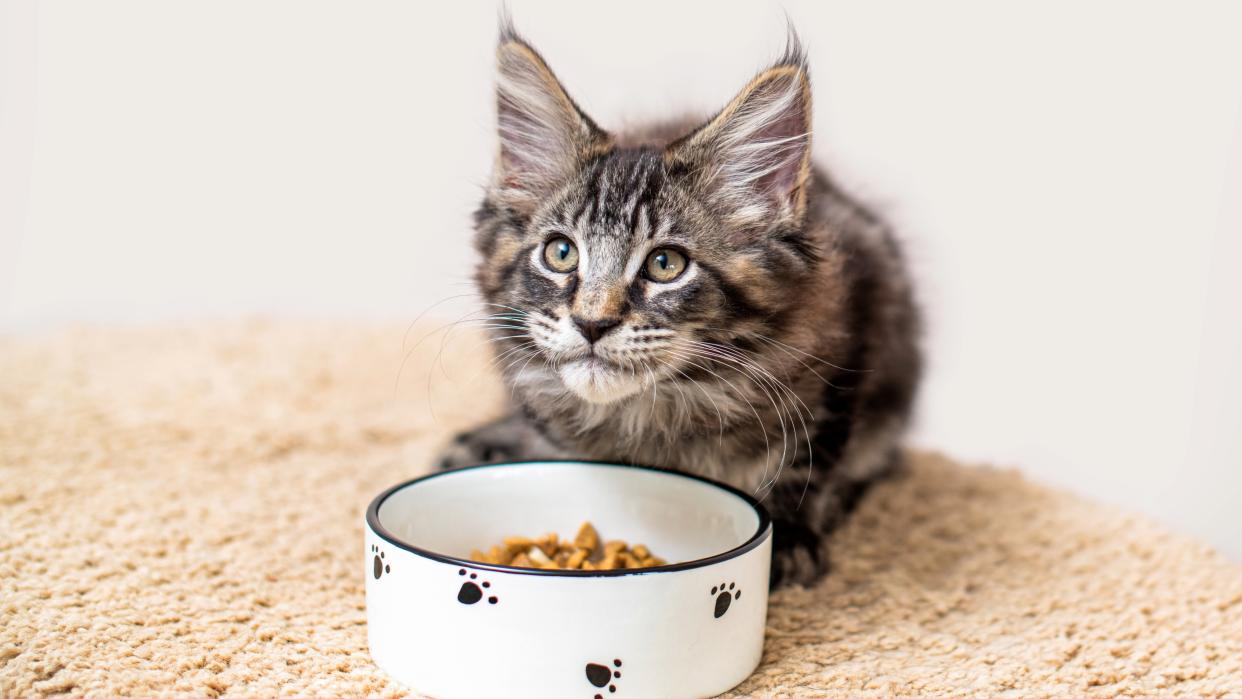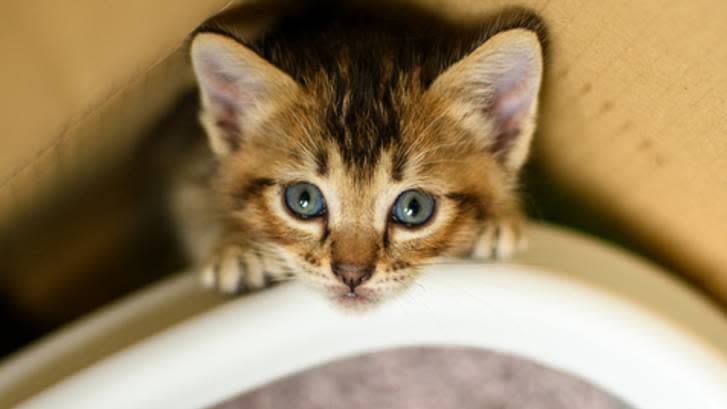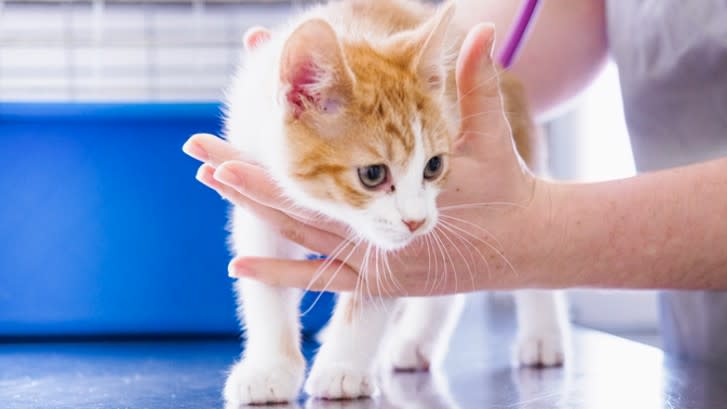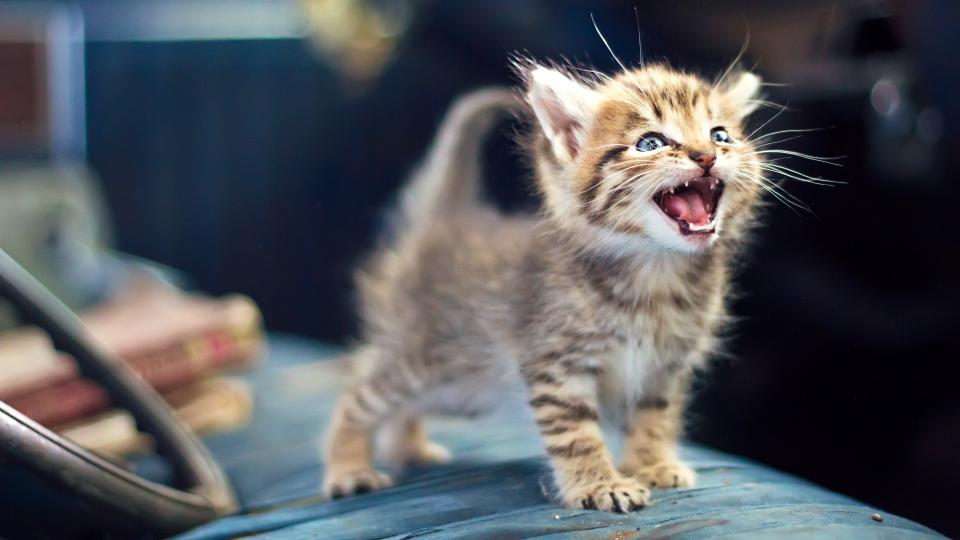Why is my kitten not eating? We asked a vet about causes and what to do

A kitten not eating can be a real cause for concern and trying to get to the bottom of why your new friend is suddenly off their food can be challenging. Stress, illness and changes in diet can all be contributing factors, but if your kitten hasn’t eaten in 24 hours, it’s important to seek medical advice.
If you’ve been filling your little one’s bowl with the best kitten food and noticed they’ve suddenly stopped showing their usual enthusiasm, you’ll want to check if they’re displaying any other changes in behavior. Have they stopped playing or grooming? Do they seem to be sleeping more than usual? Are they meowing more than they usually do? If so, we understand it can be really worrying.
When it comes to how much food should a kitten eat, it depends on their age as young kittens need less energy for growth than older kittens. Kittens are very good at regulating their food intake, but if your beloved bundle of fluff is suddenly eating very little or not at all, a trip to the vet is most definitely warranted.
To help you understand what might be going on for your kitten, we spoke to Dr. Elizabeth Racine who tells us some of the most common reasons why a kitten stops eating and shares her top tips on things you can do to get them back to the bowl.
Why would a kitten suddenly stop eating?
There can be many reasons why a kitten would stop eating and it can be hard to distinguish one cause from another. Your kitten may have stopped eating due to:
Dislike of the flavor or texture of the food
Stress
Nausea
Parasites
Gastrointestinal foreign body or obstruction
Upper respiratory infection
Other illness making your kitten feel unwell
This is why it is very important to monitor your kitten’s eating habits and take her to a veterinarian if those habits change suddenly. A sudden change in appetite can be a sign of an underlying illness that needs veterinary attention.
Our guide to preparing for your kitten's first vet visit will help ensure things are as stress-free as possible for your little one.
What to do if your kitten won’t eat

Making adjustments to a kitten’s food or environment can help, the idea being that you’re looking to entice your kitty to eat. With a set of kitten feeding tips to hand, you may be able to get your beloved bundle eating once more.
1. Try offering different foods
Try offering a mix of wet and dry food, including different flavors and textures – to see if this will entice your kitten to eat. Some cats love pate food, while others will only eat if their food has gravy! You can also try warming the food up in the microwave, but be very careful not to make it too hot and always check it with your finger to ensure there aren’t any hot spots, which could burn your kitten’s mouth.
Check out these foods kittens can eat besides cat food if you want to try and tempt their tastebuds with a tasty alternative.
2. Feed your kitten in a quiet space
Consider feeding your kitten alone in a quiet room or leaving food out overnight. Some cats that are very nervous or shy may not eat with people or other animals around. You may find that once everyone is asleep and the house is quiet, she will venture out to eat by herself.
3. Ensure their food bowl is clean
Leftover food bits can quickly grow bacteria and mold, making for a very unappetizing meal! Consider buying the best cat food bowl – one that’s wide and shallow so it will be easy for your kitten to access. Wash it with dish soap and warm water after each meal.
When to worry about a kitten not eating
It's vital that you contact your vet if your kitten does not eat within 24 hours, even if water is being consumed. If your kitten is under six-weeks-old, has stopped eating and shows signs of illness, contact your veterinarian immediately. They are at particular risk of hypoglycemia, or low blood sugar at that age, if they do not eat regularly.
Signs of hypoglycemia include loss of appetite, weakness, stumbling, falling over, disorientation, vomiting, diarrhea, seizures, and death. If you suspect your kitten may be hypoglycemic, rub some karo syrup, honey, or even maple syrup onto your kitten’s gums and take her to a veterinarian immediately.
“Proper nutrition is important throughout a cat’s life and is especially critical during kittenhood,” according to the MSD Veterinary Manual. “Growing kittens need more calories, fat, protein, vitamins, and minerals to meet their needs for rapid growth and development”.
But how often should I feed my kitten? Well, the answer is multiple times per day so if your kitten is failing to eat any of those meals over a 24-hour period, it’s a good indication of a problem – more so if your kitten, of any age, has any other symptoms of illness, such as vomiting, diarrhea, lethargy, or abdominal pain.
Diagnosing your kitten

If your kitten has not been eating, your veterinarian will first perform a full physical examination, including listening to your kitten’s heart and lungs and palpating your kitten’s abdomen to feel for any abnormalities. Your veterinarian will likely also want to perform some diagnostic tests such as blood work, radiographs (x-rays) of your kitten’s abdomen, or evaluation of a fecal sample to rule out parasites.
This will help your veterinarian rule out common causes for your kitten to stop eating. If an underlying cause for your kitten’s loss of appetite is identified, your veterinarian will prescribe an appropriate treatment plan to help get your kitten back on track.
Sometimes, no underlying cause is identified to explain your kitten’s change in appetite. In this case, your veterinarian may prescribe medication to address the symptoms. This may include a medication to alleviate nausea, an appetite stimulant, an antacid, or even intravenous (IV) or subcutaneous (SQ) fluids to help keep your kitten hydrated. Be sure to follow your veterinarian’s instructions closely, and let your vet know if your kitten does not improve on the medications.
Treating your kitten at home

Although it may be tempting to try home remedies or over-the-counter medications for your kitten, this is not a good idea. Many of these “treatments” are unhelpful at best and toxic at worst. Your kitten is fragile and cannot tolerate new supplements at this time. Many over-the-counter and other human medications are also toxic to cats and can be very dangerous to your kitten. In general, you should never use a home remedy or medication without first consulting your veterinarian.
With your veterinarian’s help – and maybe a little trial and error – you’ll hopefully see your kitten back at the food dish in no time. Remember that too many diet changes can cause an upset stomach, so transition gradually if you're going to be changing cat food. Be sure to keep an eye on your kitten’s appetite, and see your veterinarian if any further episodes of not eating occur. Most importantly, enjoy all the fun there is to be had during kittenhood!
